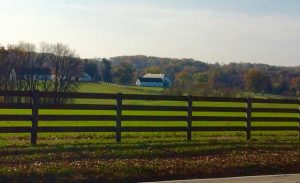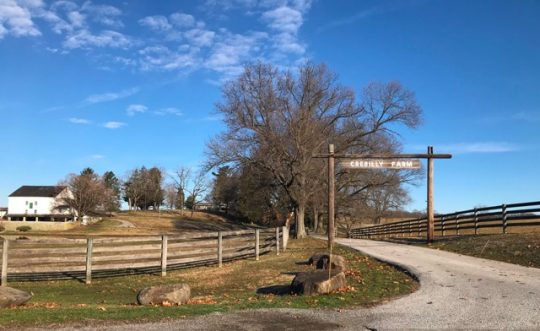At the end of 2017, the Westtown Township Board of Supervisors voted to deny Toll Brothers’ conditional-use application for Crebilly Farm, prompting jubilation from area residents that would prove short-lived.

For more than a year, opponents of the plan to erect 319 homes on a scenic, 322-acre tract had attended dozens of multi-hour meetings that produced almost 2,000 pages of testimony. They argued that the development would irrevocably harm the environment, exacerbate traffic woes, and desecrate land with Revolutionary War ties, rejecting the developer’s insistence to the contrary.
In denying the application, the supervisors cited multiple shortcomings in Toll’s proposal, such as storm water management, wastewater treatment, and traffic control. The board also concluded that during the Battle of the Brandywine, skirmishes between Hessian troops and Continental soldiers likely occurred on a swath of Crebilly now facing a battle with bulldozers.
As expected, Toll, the equity owner of the property, appealed the supervisors’ decision last month. And while some who had fought to block the plan feared that the developer’s deep pockets and litigation experience would doom preservationists’ efforts, officials from area conservancies quietly held their breath in hopes of a settlement that might mitigate the perceived desecration of an iconic property.
For years, many of the area land trusts had tried and failed to negotiate alternatives to development with the extended family of James K. Robinson Jr., a descendant of the co-founder of Acme supermarkets. However, with litigation comes the possibility of a resolution that might save at least part of the parcel from construction, they said.
Bounded by Routes 926 and 202, South New Street, and West Pleasant Grove Road, the tract has narrowly avoided previous subdivision plans. A 2003 assisted-living community and a 2012 apartment complex never materialized, but a parcel on the western side of New Street sold last year and will become two residences.
Conservation leaders, some of whom requested anonymity because they still hope to play a role in the farm’s future, said that although they would love to see the entire tract preserved, the estimated $40 million price tag makes that prospect unrealistic. Instead, they are hoping that a deal could be structured to save the most treasured portions of the property, such as the site of Revolutionary War skirmishes, the historic Darlington Tavern building, and several bucolic vistas.

Area residents don’t have to look far to see an example of a Toll Brothers’ settlement. The builder sued East Bradford Township after its supervisors gave conditional-use approval to nearby Darlington Ridge at West Chester, a planned subdivision on Tigue Road, but attached conditions that Toll found objectionable.
In late 2017, Toll and the township signed a conditional-use settlement agreement after nearly a year of talks. According to township records, Thomas A. Egan, the supervisors’ chairman at the time, said the board “would have liked to preserve the entire Tigue Farm as open space but it just was not achievable.” Instead, he called the resolution “a better plan” for the township.
Records show that Toll initially proposed homes on both sides of Tigue Road, which divides the property. Under the settlement, construction will occur only on the northern side. The approximately 30-acre southern parcel will remain open and “meld with the Strode Barn (township-owned) property and the Brandywine Greenway.” The historic English-style barn is currently being restored by the township with assistance from a grassroots advocacy group, the Friends of Strode’s Mill.
According to the settlement, Toll will construct 107 dwellings, an increase of 10 from its original plan; however, the homes will be substantially smaller, reducing the overall footprint of the development. In addition, the new plan will create a continuous greenway from West Chester University to the Strode Barn, located at the intersection of Birmingham Road and Rt. 52.
Preservationists say that Crebilly offers a similar opportunity for compromise. Funds to “buy down” the development rights, confining the development to the land closest to Rt. 202, could be pooled from a variety of sources, including government entities, private foundations, or even members of the public committed to protecting a historic resource.
Depending on how the agreement of sale is structured – and how protracted the litigation might be – either the Robinsons or Toll Brothers could decide to let their contract expire, possibly opening the door to options that might favor more conservation as well as a more positive legacy for the Robinson family.
Preservationists stressed that now is the time for creative problem-solving regarding Crebilly. Its imperiled landscape should also serve as a wake-up call to townships, like Westtown, that don’t have open-space programs or updated comprehensive plans to thwart similar development threats.
Gwen Lacy, executive director of The Land Conservancy for Southern Chester County, called citizen advocacy groups “the backbone of our work in these development scenarios.”
In the case of Crebilly, two grassroots groups – Neighbors for Crebilly, started by Vince and Elizabeth Moro, and Crebilly Farm Friends, created by Mindy Rhodes – have led the charge to galvanize public support, maintain Facebook pages, and provide ongoing email updates. The groups have received assistance from other Facebook activists through pages such as Save Crebilly Farm and Stop the Commercialization of Westtown Township.
Last weekend, Neighbors for Crebilly held a spring gala at the American Helicopter Museum in West Chester to raise funds for legal and outreach expenses. The group, which hired an attorney, recently filed a petition for intervenor status in the appeal, which would give it a place at the negotiating table, according to Vince Moro.
Preservationists recommend continuing to raise awareness and exert public pressure. On her Facebook page, Rhodes suggests thanking the Westtown Township's supervisors in writing for "their courageous decision" to reject Toll's conditional-use application, and she lists contact information for the supervisors as well as lawmakers, state and county officials and other advocacy groups.
Such efforts might prompt all of the Crebilly players to reconsider the risks of tying up their resources for an extended period of time, preservation leaders say, adding that 11th-hours saves can happen – especially if negotiations are occurring behind the scenes.
To date, no hearing has been scheduled in the Crebilly case, which has been assigned to Chester County Court Judge Mark Tunnell. For more information, visit https://www.facebook.com/crebillyfarmfriends/, or https://www.facebook.com/neighborsforcrebilly/. In addition, Westtown Township has filed all of the relevant documents on its website: http://www.westtownpa.org.


 (5 votes, average: 4.20 out of 5)
(5 votes, average: 4.20 out of 5)
Comments